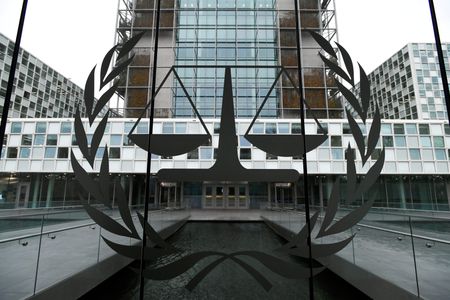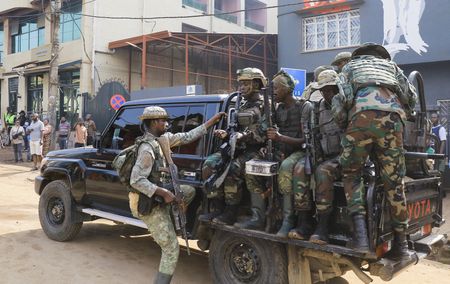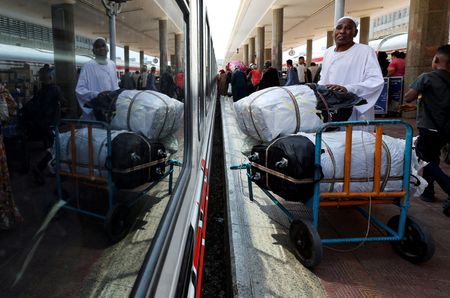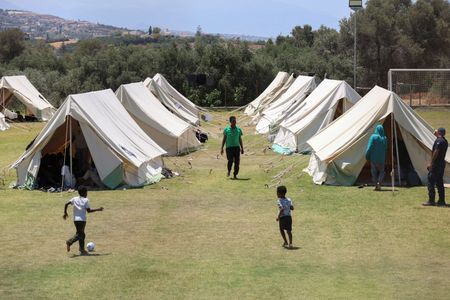By Stephanie van den Berg
THE HAGUE (Reuters) -Israeli Prime Minister Benjamin Netanyahu begins a four-day visit to Hungary on Thursday, defying an International Criminal Court arrest warrant over allegations of war crimes in Gaza.
Israel has rejected the accusations, which it says are politically motivated and fuelled by antisemitism.
Here are some facts about the ICC:
WHEN WAS THE ICC SET UP AND WHY?
The court was established in 2002 to prosecute war crimes, crimes against humanity, genocide and the crime of aggression when member states are unwilling or unable to do so themselves. It can prosecute crimes committed by nationals of member states or on the territory of member states by other actors. It has 125 member states. The court’s budget for 2025 is about 195 million euros ($202 million).
WHAT IS THE ICC INVESTIGATING?
The ICC is conducting investigations from the Palestinian territories to Ukraine and African states such as Uganda, Democratic Republic of Congo and Kenya, to Venezuela in Latin America and Myanmar and the Philippines in Asia. It says there have been 32 cases before the court, with some having more than one suspect. ICC judges have issued at least 60 arrest warrants.
HOW MANY PEOPLE HAS THE COURT CONVICTED?
ICC judges have issued 11 convictions and four acquittals. Twenty-one people have been held in the ICC detention centre in The Hague and have appeared before the court, and 31 people remain at large. Charges have been dropped against seven people due to their deaths.
Of the 11 convictions, only six have been for the court’s core crimes of war crimes and crimes against humanity. The others were for crimes such as witness tampering. The six convicted men were all African militia leaders from Democratic Republic of Congo, Mali and Uganda. Terms ranged from nine to 30 years in prison. The maximum possible term is life imprisonment.
WHO IS ON THE COURT’S ARREST WARRANT LIST?
Former Philippines President Rodrigo Duterte was arrested on March 11 on a warrant from the ICC. Prosecutors accuse him of forming and arming death squads held responsible for the killing of thousands of perceived drug users and dealers during his rule. Duterte has said he takes full responsibility for the “war on drugs” as he braces for the legal battle.
Other notable ICC suspects are Netanyahu, who is accused of being criminally responsible for acts including murder, persecution and using starvation as a weapon of war in the Gaza conflict, and Russian President Vladimir Putin, accused of the war crime of illegally deporting hundreds of children from Ukraine.
Both Israel and Russia have repeatedly denied that their forces have committed atrocities in Gaza and Ukraine respectively and have argued the ICC has no jurisdiction over them.
When it issued the warrant for Netanyahu, the ICC also issued a warrant for the arrest of Hamas military commander Mohammed Deif, whose death was confirmed after the warrant was issued.
The ICC prosecutor has also requested arrest warrants for senior Afghan and Myanmar leaders, but those have not been officially approved by judges.
WHICH COUNTRIES ARE NOT MEMBERS OF THE ICC?
Although the court is supported by many United Nations members and the European Union, other countries such as the United States, China and Russia are not members, arguing the ICC could be used for politically motivated prosecutions.
Myanmar is not a member of the court, but in 2018 and 2019 judges ruled the court had jurisdiction over alleged cross-border crimes that partially took place in neighbouring ICC member Bangladesh, such as deportation and persecution, and said prosecutors could open a formal investigation.
Israel is not a member and does not recognise its jurisdiction, but the Palestinian territories were admitted as an ICC member state in 2015. This, together with a ruling by judges, means the court can look at potential war crimes carried out by Hamas fighters in Israel and by Israelis in the Gaza Strip.
The Philippines is not currently a member of the ICC but was between 2011 and 2019, when the unilateral withdrawal by Duterte became final. Under the court’s founding 1998 Rome Statute, even if a state withdraws as a member it retains jurisdiction over crimes within its jurisdiction committed during the membership period.
In February 2025, U.S. President Donald Trump authorised economic and travel sanctions targeting people who work on International Criminal Court investigations of U.S. citizens or U.S. allies such as Israel. Chief Prosecutor Karim Khan has so far been the only ICC staff member targeted by sanctions, which are set to go into force on April 7.
(Reporting by Stephanie van den Berg; Additional reporting by Anthony Deutsch; Editing by Alison Williams)





